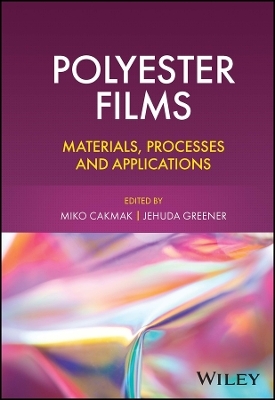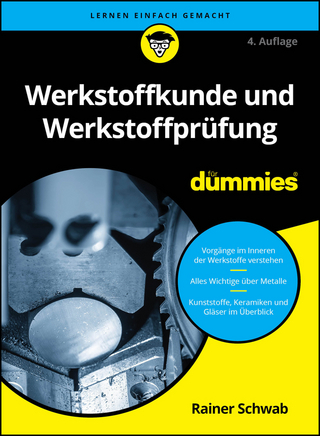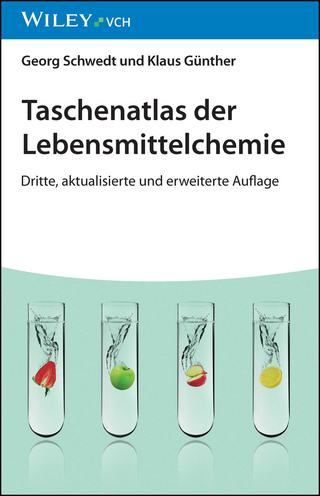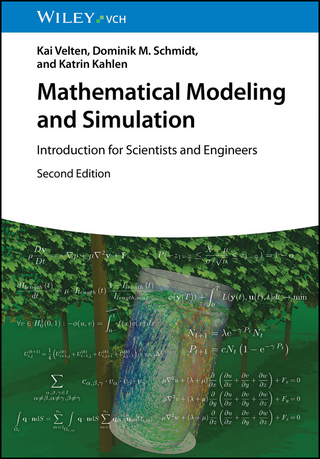
Polyester Films
John Wiley & Sons Inc (Verlag)
978-1-119-53575-1 (ISBN)
Bringing together world-class experts to review the state-of-the-art of key materials and processing elements of polyester film technology, Polyester Films covers a wide range of topics with direct utility to students, practitioners, business managers and researchers, in academia and industry. Topics covered in this volume include survey of optical and physical properties, microlayer coextrusion, polyester ionomers, polyester blends, biomedical applications and recycling . In particular, the text focuses on novel design and application of polyester films, such as those used in the production of flat panel displays, flexible electronics, and barrier films.
The overriding objective of the book is to scope the multitude of options available to material and product designers in manipulating the properties of polyester films to meet specific performance and product criteria. These options include synthetic modifications (copolymerization), physical enhancements (blending), and process upgrades (tenter-frame changes, coextrusion, and coating).
Edited by two highly qualified material scientists with extensive experience in academia and industry, Polyester Films covers topics such as:
Historical review of polyester film technology
Overview of physical performance and applications of key polyester films, especially PET and PEN
Synthetic options available for manipulating the structure and properties of polyesters, with special focus on polyester ionomers
Main blending options available to enhance the performance of commodity polyesters
Rheo-optical properties of polyester films and corresponding testing methodology
Micro-layer coextrusion technology as applied to modify the performance of polyester films
Bio-medical applications
Polyester recycling, with special focus on upcycling
With an interdisciplinary approach covering the performance of real-life products and components, Polyester Films is an essential resource for researchers and engineers in academia and industry working in physics, material science, chemistry and process engineering. This volume should also be invaluable for graduate students and early-career researchers in similar fields.
Prof. Mukerrem (Miko) Cakmak is currently the Reilly Chaired Professor of Materials and Mechanical Engineering at Purdue University, USA. He is one of the founders of the Polymer Engineering Department at the University of Akron where he was Harold A. Morton Chair and Distinguished Professor of Polymer Engineering for 32 years. Dr. Jehuda Greener is an independent consultant specializing in film technologies and polymeric materials and processes. Until 2013, he was a Technology Associate and Distinguished Scientist with the Tech Center of Dow Chemical’s Advanced Materials Division (Formerly Rohm and Haas Electronic Materials).
List of Contributors xi
Preface xiii
1 Polyester Films: An Overview 1
Jehuda Greener
1.1 Introduction 1
1.2 Historical Overview 6
1.3 Physical Properties 7
1.4 Light Management Films 12
1.5 Summary 15
References 16
2 Polyester Materials and Properties 19
Dennis J. Massa
2.1 Introduction 19
2.2 Thermoplastic Polyesters: PET, PBT, and PTT 20
2.3 Thermoplastic Polyesters Containing Cyclic Diols 22
2.4 Thermoplastic Polyester Films: PET and PEN 23
2.5 Aromatic Polyesters 26
2.6 Thermotropic Main- Chain Liquid- Crystalline Polyesters 27
2.7 Wholly Aliphatic Polyesters 28
2.8 Branched and Hyperbranched Polyesters 28
2.9 Thermoplastic Polyester Elastomers and Multiblock Copolymers 29
2.10 Biodegradable and Compostable Polyesters, and Polyesters from Renewable Feedstocks 29
2.11 Dependence of Polyester Properties on Polymer Entanglement Molar Mass 31
2.12 Polyester Blends 32
2.13 Ion- containing Polyesters 33
2.14 Filled Polyesters 34
2.15 Polyester Degradation 34
Acknowledgment 35
References 35
3 Film Properties and Internal Structure Development of Miscible Polyester Blends 47
Karnav Kanuga
3.1 Introduction 47
3.1.1 Thermal Transitions in Polyester 48
3.1.2 PET/PEN Blends 49
3.1.3 PET/PEI Blends 52
3.1.4 PEN/PEI Blends 56
3.1.4.1 Liquid- Liquid Transition Temperature (T ll) 61
3.1.5 PEN/PEI/PEEK Ternary Blends 63
References 65
4 Polyester Ionomers 67
Robert A. Weiss
4.1 Introduction 67
4.2 Random and Segmented Polyester Ionomers 69
4.3 Poly(Ether- Ester) Ionomers 89
4.4 Random Polylactide Ionomers 104
4.5 Telechelic Polyester Ionomers 107
4.6 Liquid Crystalline Ionomers (LCI) 112
4.7 Polyester Ionomer Patents 126
4.7.1 Ionomer Synthesis 126
4.7.1.1 Polyester Ionomers 126
4.7.1.2 Poly(Ether Ester) Ionomers 127
4.7.2 Polyester Ionomer Applications 127
4.7.2.1 Adhesives 127
4.7.2.2 Films, Fibers, and Textiles 128
4.7.2.3 Imaging and Inks 128
4.7.2.4 Coatings and Packaging 129
4.7.2.5 Antistatic and Conductive Compositions 130
4.7.2.6 Polymer Blends, Compatibilizers, and Nanocomposites 130
4.7.2.7 Cosmetics and Personal Care Products 131
4.7.2.8 Miscellaneous Applications 132
Abbreviations 132
References 135
5 The Rheo- Optical Properties of Polyester Films 157
Baris Yalcin and Miko Cakmak
5.1 Birefringence and Its Measurement 157
5.2 Polyester Films 164
5.3 Online Optical Measurements 167
5.4 Polyethylene Terephthalate 176
5.4.1 Simultaneous Stretching 176
5.4.1.1 Regime I 178
5.4.1.2 Regime II 180
5.4.1.3 Regime III 180
5.4.1.4 Regime IV 181
5.4.2 Sequential Stretching 181
5.4.2.1 Regime I 182
5.4.2.2 Regime II 183
5.4.2.3 Regime III 184
5.4.3 Relaxation 184
5.4.4 Heat- setting 189
5.4.4.1 Category I 190
5.4.4.2 Category II 192
5.4.4.3 Category III 192
5.5 Poly(Ethylene Terephthalate) (PET) and Poly(Etherimide) (PEI) Blend 195
5.6 Polyethylene Naphthalate (PEN) 198
5.7 Poly (Lactic Acid) 209
5.8 Summary 215
5.8.1 Stretching Stage 215
5.8.2 Relaxation Stage 217
5.8.3 Heat- Setting Stage 217
References 217
6 Nano- Layered Films and Foams 225
Troy Su, Abdullah Al Faysal, Jianxiang Zhao, and Patrick C. Lee
6.1 Introduction 225
6.2 Processing of MNL Films 226
6.2.1 Manufacturing Technologies of Multilayered Films 226
6.2.2 MNL Structures Produced by Layer Multiplication Technology 228
6.2.3 Flow Instabilities in Layer Multiplication Technology 229
6.3 Microstructure of MNL Films 233
6.3.1 Interphase Formation 233
6.3.2 Confined Crystallization 236
6.3.3 In- Situ Fibrillation of a Secondary Phase 239
6.3.4 Orientation of Fillers and Fibers 239
6.3.5 Selective Spatial Confinement of Phases and Additives 240
6.4 Mechanical and Functional Properties of MNL Films 242
6.4.1 Mechanical Properties 242
6.4.2 Barrier Films 248
6.4.3 Dielectric Films 250
6.4.4 Shape- Memory Films 251
6.5 MNL Film- Foam Structures 253
6.5.1 Polymeric Foams and Foaming Process 253
6.5.2 Fabrication of Microcellular Foam Structures 254
6.5.2.1 Cell Nucleation 255
6.5.2.2 Cell Growth 257
6.5.2.3 Cell Stabilization 258
6.5.3 Processing of MNL Film- Foam Structures 259
6.5.4 Properties and Applications of Foamed Polyesters 261
6.5.4.1 Micro- and Nanocellular Foams 261
6.5.4.2 MNL Film- Foam Structures 262
6.6 Summary and Perspective 263
List of Abbreviations 264
References 265
7 Heat- Setting of Polyester Films 277
Jehuda Greener and Andy H. Tsou
7.1 Introduction 277
7.2 Some Observations on the Effects of Heat- Setting 278
7.2.1 Densitometry 279
7.2.2 Thermal Analysis 282
7.2.3 Thermomechanical Analysis 285
7.2.4 Dynamic- Mechanical Analysis 287
7.2.5 Optical Properties 289
7.2.6 X- Ray Diffraction 291
7.3 Morphological and Microstructural Implications 295
7.4 Summary 300
References 302
8 Polyester Materials in Biomedical Applications 306
Ebrahim Jalali Dil, Abdellah Ajji, and Amir Saffar
8.1 Introduction 306
8.2 Perquisites for Biomedical Applications 307
8.2.1 Biocompatibility 307
8.2.2 Biodegradability 308
8.3 Biomedical Applications of Polyesters 309
8.3.1 Tissue Engineering 309
8.3.2 Drug Delivery and Controlled Release Systems 321
8.3.3 Orthopedic Applications 325
8.3.4 Other Applications 327
8.3.4.1 Polyester- based Suture 327
8.3.4.2 PET Blood Collection Tubes 327
References 328
9 Upcycling of Polyesters 343
Ion Olazabal, Elena Gabirondo, Coralie Jehanno, Kazuki Fukushima, and Haritz Sardon
9.1 Introduction 343
9.2 Upcycling of Poly(Ethylene Terephthalate) 344
9.2.1 Hydrolysis 345
9.2.2 Alcoholysis 348
9.2.3 Aminolysis 351
9.3 Upcycling of Poly(Lactic Acid) 354
9.3.1 Hydrolysis of PLA 354
9.3.2 Alcoholysis of PLA 354
9.3.3 Hydrogenation of PLA 355
9.4 Other Polyesters 356
9.5 Conclusion 359
Acknowledgment 359
References 359
Index 364
| Erscheinungsdatum | 06.04.2021 |
|---|---|
| Verlagsort | New York |
| Sprache | englisch |
| Gewicht | 763 g |
| Themenwelt | Naturwissenschaften ► Chemie |
| Technik ► Maschinenbau | |
| ISBN-10 | 1-119-53575-1 / 1119535751 |
| ISBN-13 | 978-1-119-53575-1 / 9781119535751 |
| Zustand | Neuware |
| Informationen gemäß Produktsicherheitsverordnung (GPSR) | |
| Haben Sie eine Frage zum Produkt? |
aus dem Bereich


